- Home
- Claire North
Gamehouse 01 - The Serpent Page 8
Gamehouse 01 - The Serpent Read online
Page 8
- You’re here to laugh? he exclaims. - Is that what you want?
- No. You still have cards to play, a piece at your command. Tiapolo cannot be Tribune, and you cannot enter the Higher League, but we may still do a good turn for each other.
- You suggest…an alliance?
- There is nothing in the rules to prevent it.
- You’ve just said I’ve lost.
- And you have. The question is whether you lose everything.
A shadow follows her through the city.
This time she does not run, does not stop, does not wait, does not fear.
She remembers now how good it is to refuse to be afraid.
She stops on the Rialto. Even at this hour, merchants and hawkers are bartering their wares, and crowds jostle for space across the waterway. Architects and detractors predicted that the bridge would not stand for more than ten years, so absurd was its design of arches and white stone, but here it is two decades later, as implausible and defiant as Venice herself.
She waits, and Silver comes, no smile on his face.
- Shall we walk? she asks before he can speak.
They walk.
Chapter 31
- First Belligno, now Tiapolo throws in their lot with you? he asks as they move through the night-time fires of the city. -You have an unorthodox approach to victory, turning your enemies to friends.
- My approach to victory is that I intend to win. The rest is merely tactics. You mentioned some sort of arrangement? Answers to questions?
- You have more questions than I do, I think.
- And yet you are still interested in me, she replies. - Though I think you are fascinated by my mind rather than any other parts.
- To speak truth, my lady, I think you are going to win.
- Am I? Faliere still controls trade with the east; Contarini still commands the power of the bishops and the builders of the city. I have gained ground, but not enough to guarantee the win.
- But you still have pieces left to play, do you not? A coin, for example – do I guess correctly? I do! When I looked at the board and saw that Seluda had been dealt as a king rather than Belligno, I did wonder what cards might have been given to his player.
- You will have to explain that to me.
- I will, but we must make a deal.
- What manner of deal? I will not compromise the game.
- Nor shall I ask you to.
- Then speak. What manner of deal?
- One day, perhaps in week, or a month, or a year, or ten years, or more years besides, I will need a favour. I will be in a certain situation, a peculiar difficulty, and at that time I will ask you to lie to someone of whom you are afraid. Do this, and I will answer any questions you have, to the best of my ability.
- The deal you propose is skewed. I have an idea of what I gain from it now, but no conception of the scale of what I might lose later.
- Nevertheless, these are the only terms I will accept.
We walk a while in silence. The city closes in about us; we go further and further from the Grand Canal, from the busy paths of the city, into the dark places, the narrow places, the alleys and the caverns formed by overhanging houses, across waterways too tight for the gondola, too wide to be called a gutter, past shrines to weeping saints and martyred heroes, braziers where the beggars huddle and the cold ladies of the night warm their whitened fingers. We walk, we walk through streets never changing, where blood is as old as stone, ancient blood of ancient families whose grandparents were fed on the water of the lagoon that shall one day be sprinkled on the brow of the newborn infant that shall carry on the name, in the house, in the street, in this frozen city of Venice. We walk, and no one knows our significance or our strength, no one but the knowing, who we greet as familiar strangers, unsung friends. We walk.
Until at last
- All right, she says, and stops herself, and thinks a moment longer. And then, - All right. We have a deal.
- Then ask.
- Is the game I am playing fairly balanced?
- No.
- How do you know?
- If it was a game of equals, Belligno should have been assigned a player, not Seluda. His position was stronger, equivalent to Tiapolo, Faliere and Contarini. Seluda was a weaker piece. Equally, the man who played Tiapolo was not yet ready for the higher league. His tactics were poor, his intentions unclear. The choice of pieces inherently biased it in favour of Faliere and Contarini.
- Why?
- The Gameshouse is…old. It is not bound to any place, but rather has doors throughout the world. This game in Venice is one of hundreds, maybe thousands, being played in places you cannot dream of, and only an entry-level game at that, a little skirmish on the field. The house deals in empires and kings, in armies and Churches, and its players are some of the oldest and…perhaps not wisest, but shall we say most determined…people I have met. With such a purpose, and spread so wide, it should not be hard to consider that a body of this sort could influence events. A piece like Tiapolo is given a player who cannot win; a potential Tribune such as Belligno is not, and through this disadvantage is denied an opportunity to secure his place. We tell ourselves that the Gameshouse has no objectives beyond the playing of the game, but I have lived long enough and played enough games to question this. The nature of the game changes the world, and though I cannot swear to it, I would suggest that the distribution of cards, which should be random, is also skewed to produce an outcome that is more fitted to the Gameshouse’s will rather than the player’s abilities.
- To what purpose?
- That…I cannot say. It is not a question players – even the oldest – like to ask. Perhaps only the Gamesmaster knows.
- I have been dealt a coin.
- Yes. I thought you might be.
- What is it? It is out of place in the deck, a mundane thing, not a piece that I understand.
- May I tell you a story?
- Is it true?
- It is often repeated – will that serve?
- Tell me.
Chapter 32
It is said, (so Silver began) that there have been only three Gamesmasters in all the years in which the Gameshouse has existed. I know nothing about the first, but the second was a woman, dressed all in white, her face hidden as was her purpose. The Gamesmaster is the head and source of all the games that are played. Her rules are absolute; her judgement is final. She does not play herself, but rather devises and controls the games that others play – except very, very occasionally. When Rome fell, it is said that the Gamesmaster was challenged to play such a game that empires shook with it. When Luther pinned his articles to the church door, it is suggested that the Gamesmaster watched, and that these things which to us seem no more than the turning of the world are – to the ones who wear white – moves upon a board bigger than any of us can see. Whatever the truth of that, what is generally accepted is that the Gamesmaster has been on a few occasions challenged for her crown by players such as you or I. No one knows the game that they play, the master and the rival, and only one such match has there been in all the years that I can remember. It was a game played between a woman of Normandy and the Gamesmaster, and it lasted nearly seven years. During this time, the operation of the house ceased and all things were turned to this single conflict. Wars raged across Europe and throughout Asia. Temples fell in Africa and the New World; peoples rose against the lords of India; plague spread and the wild horsemen rode freely through burning lands – but were these events connected? Were these the signs of a battle fought for the Gamemaster’s throne? I don’t know, and wish I did.
Whatever the course of the game, after seven years the challenger vanished. Disappeared. And within a day of her disappearance, the Gameshouse opened its doors again as if nothing had happened. A great many assumed that she was dead; others suggested that she was claimed by the Gameshouse in defeat: her body, her mind, her very soul, sucked into the endless corridors of the place to be bound for ever in service to the house
. One or two – a very few at that – suggested that no, she had not lost at all, but won, and in victory she had become the Gamesmaster, as bound to the house as surely as if she had lost and been enslaved, for the Gamesmaster may only die when defeated, only leave their office by the same rules that they enforce on the board.
But you are wondering what all of this has to do with your coin, yes?
The woman had a husband. The fashions of the time would have it said that the husband had a wife, a lesser creature to complement his greatness, but in truth he was compared to her, an amateur at the game, as I think your husband is now. He was a besotted fool with just enough wisdom to know to trust in the more vasty intelligence of his wife. For seven years he let her play the game, never fully understanding its scale or import, until that fateful day when she vanished, whether to death or slavery or victory he did not know. All he knew was that the Gameshouse had taken her and, incensed and suddenly awake to that which had been obvious, he hammered on the silver door which leads to the halls of the higher league, begging and threatening for answers as to the fate of his wife. No answers were given, for he was an average player in the lower league, and the rules of the game would not permit him access to those who might know. For years he struggled to find answers to his questions and achieved nothing, for no matter how good he grew at the game, the house would not welcome him to the higher league. At last, desperate, now ill and his wealth lost, rumours came to him of a place in a far-off land where an ancient magician might be able to help him.
Selling the last of what little he had, he journeyed east to a land of high plateaus and long grass, where trees barely deign to grow on the grey mountainside and there are a great, warlike people dressed in furs and armed with spears, who their neighbours call barbarian and who laugh to hear themselves so called, knowing that “barbarian” is their strength, is their fierceness and their rage, and rejoicing that others have wisdom enough to perceive it.
There, his beard grown long and his shoes turned to tatters, at the end of his strength he followed a little stream down to a hidden valley, where great bonfires blazed and people danced in honour of thunder and rain. The people who found him had no word for law – no, not even its concept. Strength and life were the only notions they understood, the only justice that they comprehended, and to enforce anything else by these means was to waste strength itself. They laughed at this stranger then, this ragged creature come to their home, robbed him of what he had left and cut him to see if his blood was red like theirs (and it was) and took him before the strongest and mightiest of their kind in case he had some opinion on the matter and so as not to offend him by making a decision for themselves.
This strong man, this mighty man – how can I best describe him? His beard was black, his hair was straight, his eyes were ocean-green, his skin the colour of walnut but burnt too, reddened by the wind and the sun to a sort of sanded roughness. He was not particularly tall, but had that splayed manner about him, an easiness of leg and arm that sprawled in every direction, confident of himself and his little kingdom, and when the bloody stranger was pushed before him, he looked on this man with no more interest than a soothsayer might look upon an inauspicious sacrifice.
At last he spoke, and the man was astonished to hear his own language pronounced clearly, so far from home.
- Why are you here? asked the king of the valley.
- I’ve come looking for help, replied the man.
- Help? Help yourself. Why ask me?
- I’m told you know something of the Gameshouse.
- Do I look as if I do? Do I look as if I care?
At these words, the man drew himself up a little more before this king, and said, - No, I cannot see any sign of it in your face, but you did not stop to question what the Gameshouse is, but derided it at once, and I think you are therefore the man known sometimes as Bird, and an enemy of the house and the one who rules it. Am I right?
- You bore me, replied the man called Bird. - Your words bore me.
At this he turned away and his subjects leapt on the man and seemed as if they would tear him to pieces, eat him even, until he cried out:
- The Gameshouse stole my wife!
Hearing this, the king of that place turned back a little, though he showed no sign of sympathy, and all his subjects slunk away a little, disappointed to be denied their sport.
- So? he asked. - What is that to me?
- I am ill and poor, replied the man. - I will die, I know it, before I can find the truth. The only way I know to find my wife is to become a great player; the only way I can play is if I have more time; the only way I can win time is by being a great player! So I am trapped, and so I shall die and never know the truth of it. Help me. I had some money but your people took it…
At this he held out the only coin he had left, ancient and small, a little Roman thing shaking in his palm.
- Money? replied Bird, his voice rolling with laughter and rage all at once. - Do you think I care for money? Do you think I care for the things of men, for coin and law and truth and kings and husband and wife? These are the false things, the made-up things, the not-of-the-wildlings things that mankind cages itself with. Do I look caged to you? Do I look like a prisoner?!
Incensed, he grabbed the man by the throat so that in his choking half-state he could not speak, could not stammer out some denial, some defence, but rather then thought he would die.
A moment there he hung, this poor would-be player, his life in someone else’s grasp as whose life is not? As whose fate is not suspended in that place between a stranger’s whim and the universe’s contempt?
Then suddenly Bird let him go, and his humour brightened as he paced a little, smiling at some new thought. The more he thought it, the more it entertained, until suddenly he stopped and laughed out loud, as great and rich a sound as the man could have eaten it. Then he bent down, picked up the discarded coin and, pressing it into the man’s shaking fist said, - A game. Very well, little man, a game.
- What game?
- Something near your level, something that would displease the Gamesmaster, but still a game with rules and consequences. Toss the coin. Call a side. Get it right, you’ll live, and long enough to play your game, or rather to play her game, the game of the Gameshouse. Choose wrong, you die. A pretty sport, is it not?
- It’s chance, not a game.
- All things are chance. Nature is chance. Life is chance. It is a human madness to try and find rules where there are none, to invent constraints where none exist. The only thing that matters is the choice. So choose. Choose.
And the man did.
Chapter 33
- Who is Bird? asks Thene as we walk together through the night-time of Venice.
- Hard to say, Silver replies. - He is neither a player nor a piece; nor does he exist within the Gameshouse. I heard a man from the east once posit a theory – a sweeping, spectacular theory! – that as the Gameshouse exists, so there must exist Bird. There must be an answer to the rules, a house of misrule and chance to balance against the precision and order of the game. However the argument waxed of the philosophical to my ear, so I didn’t pay much attention to it.
- You are saying that it’s Bird’s coin that I hold?
- I am saying that a story tells of a coin which, when thrown, may hold death on one side and life on the other. In a sense such things are anathema to the Gameshouse, for there is no skill, no intelligence or craft in such a judgement, merely the outcome. Then again, it might be argued that such a thing is the purest game there is, unsullied by complexity and true to life, where chance will not change her colour for the wise man or the fool.
- As a player, should you be telling me this? Should you instruct another in the value of their pieces?
- Does it say in the rules that I cannot?
- No.
- Then I can. Players rarely help each other, as I am sure you will learn. Every player who lives too long becomes a rival who must be challenged or d
isplaced. But as you yourself so aptly demonstrate, there is great power to be gained from turning an enemy to a friend.
- Am I an enemy?
- You are a player, as I am.
- But you are playing another game, are you not?
He does not answer. She tuts, a little shaking of her head. - Come now, come, she says. - You said you would answer my questions; I am still asking them.
- Yes. I am playing another game.
- And am I to be a piece?
- Perhaps.
- One of my pieces died the other day.
- I saw.
- I had not thought…it had not occurred to me that…silly, now that I think about it. As you say, there is no reason in the rules why a piece may not die, why another may not kill. I simply had not considered it. I had not…but it is done. The game goes on.
- Thene.
He has stopped, and so do we, and as we stop so it seems does all of Venice, the night running cold, the walls bending to listen, listen, conspiracy is afoot.
- My lady, he corrects himself, trying to find the words again. - Do not think that people do not die in this game. Do not flinch now.
- I won’t, she replies. - I understand, and have understood from the very first, why a king may want a player to play upon him, why Seluda, Faliere, Tiapolo and Contarini have agreed to be pieces in our hands. Their ambitions are coloured by feeling, desires and commitments; they hear the cries of loved ones, see pain in their friends. A man dies and they must grieve, repent, question their intents and its consequence. Victory for them is a means to ever-changing ends, to fortune and honour, comfort and prestige, and the tools they deploy are daughters, sons, companions and things of value which were hard to earn and once used, cannot be won again. This tangle of things clouds simple intent, and intent should be only this – victory. Victory and the prize. We are players. They are the pieces. Winning is all.
So saying, she turns away and we are…
…what are we?
Are we perhaps a little sad? Have we, who know the turning of the times and have heard whispers of a future not yet named, developed some semblance of sentimentality that clouds us to the truth of things? Do we wish to be victorious and humane? How foolish we have become in our old age. How unwise. We must purge this sentiment from our souls and remember again and again: it is the victory – it is the win. The rest is only a cage.

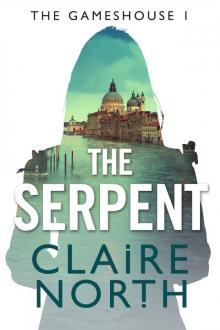 Gamehouse 01 - The Serpent
Gamehouse 01 - The Serpent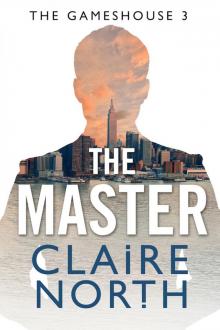 The Master
The Master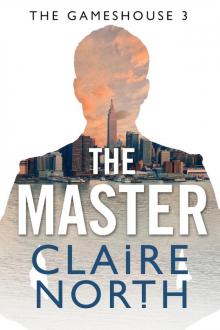 Gamehouse 03 - The Master
Gamehouse 03 - The Master The Thief
The Thief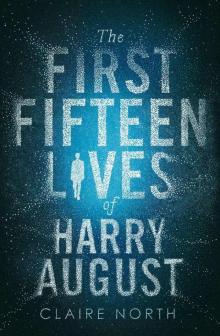 The First Fifteen Lives of Harry August
The First Fifteen Lives of Harry August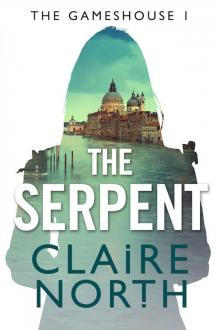 The Serpent
The Serpent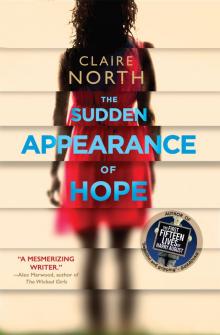 The Sudden Appearance of Hope
The Sudden Appearance of Hope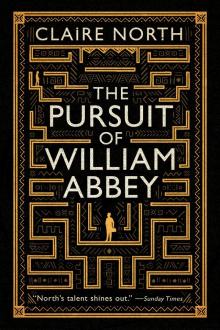 The Pursuit of William Abbey
The Pursuit of William Abbey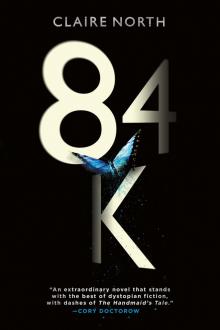 84k
84k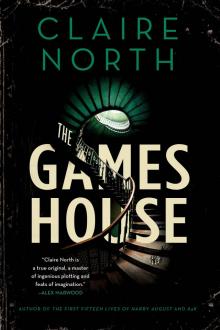 The Gameshouse
The Gameshouse Touch
Touch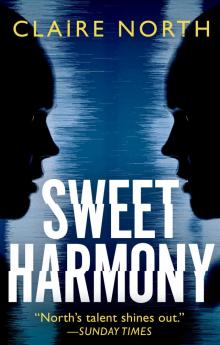 Sweet Harmony
Sweet Harmony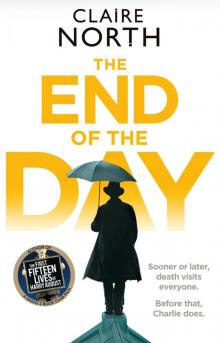 The End of the Day
The End of the Day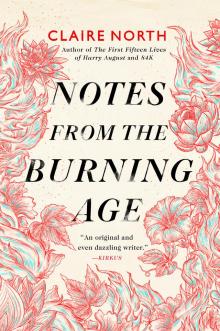 Notes from the Burning Age
Notes from the Burning Age